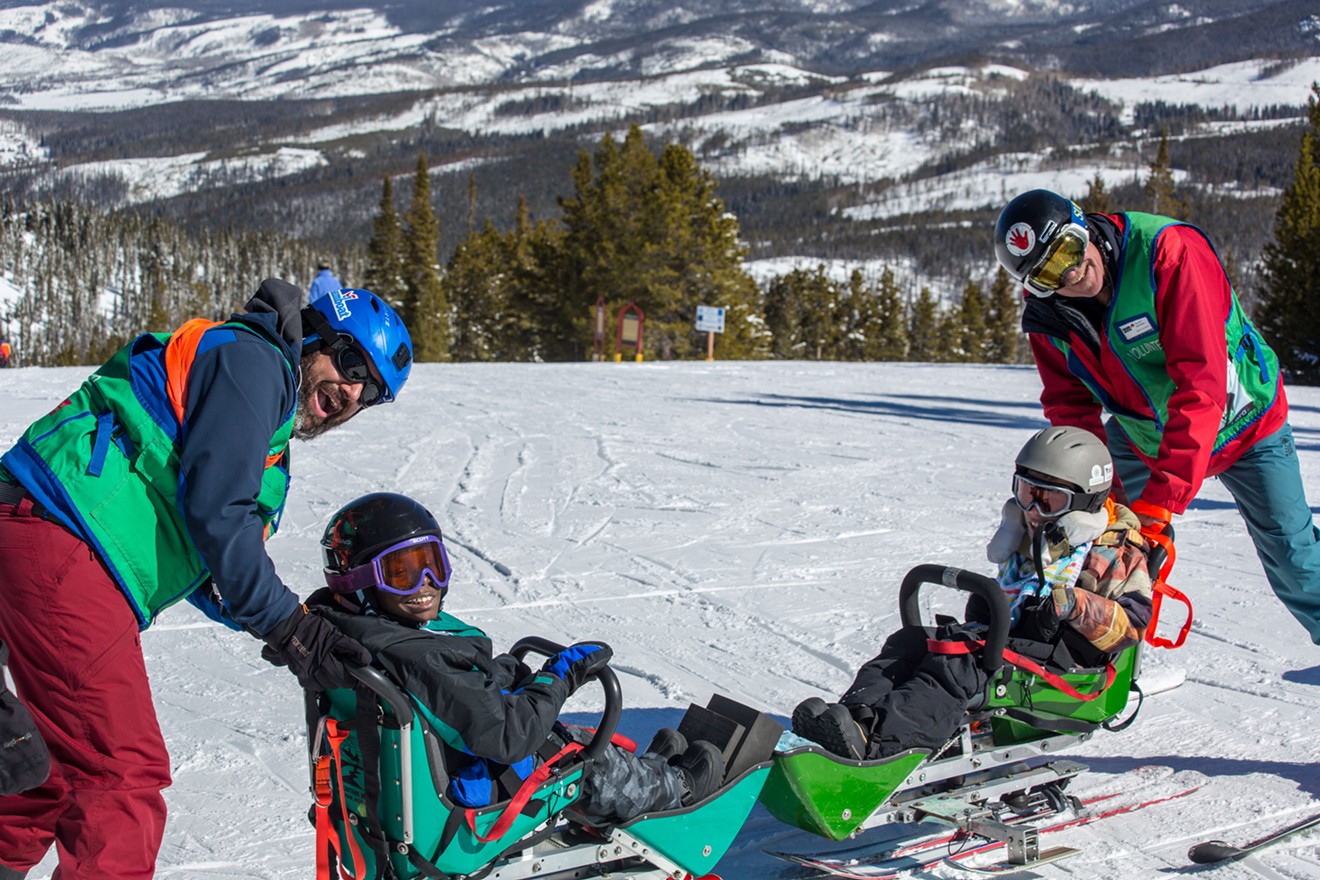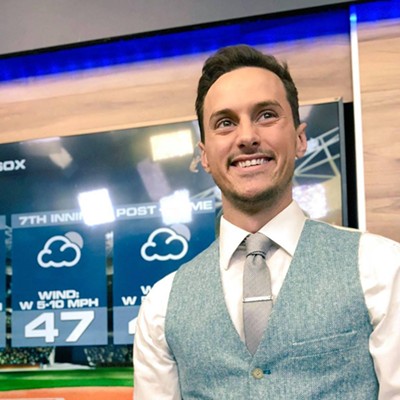This has been a tough year for anniversary celebrations. The National Sports Center for the Disabled turned fifty in 2020, but the NSCD wasn’t able to have a big bash — even if this anniversary is really something to celebrate.
In 1970, legendary ski instructor Hal O’Leary, along with Jerry Groswald and Jack Buchheister, founded the Winter Park Handicapped Ski Program as a way for the resort to help children with disabilities — specifically, 23 patients with amputations from Children’s Hospital of Denver. In 1977, the organization spun off as a 501(c)(3) nonprofit with a new name, the National Sports Center for the Disabled, and an expanded mission: to help anyone living with a disability to enjoy all kinds of outdoor activities. In the years since, the NSCD has grown from providing adaptive ski lessons to offering more than twenty group and individual outdoor experiences, everything from rock climbing to kayaking, horseback riding, sailing and, of course, skiing. About 4,000 children and adults with disabilities participate in NSCD programming each year.
All told, the NSCD has worked with about 150,000 people since it was founded fifty years ago.
The motto of the organization is to “enable the human spirit through therapeutic sports and recreation,” and the NSCD takes pride on building an athlete’s self-confidence and overall mental health. “It just takes one experience for the participants to realize that this is a game-changer,” says Kim Easton, NSCD president and CEO. And that holds for volunteers and staffers as well as disabled athletes, she adds: “Once you learn about the NSCD, you will always be involved, because it’s such joyous and passionate work.”
Thanks to the organization, eighteen-year-old Kyle Taulman has been participating in recreational and competitive sports since he was five. When he was two, he was diagnosed with Stage 3 high-risk neuroblastoma, which left him partially paralyzed. Today, Taulman is training to compete on the U.S. Nationals team as a mono-skier, and he hopes to make it to the 2022 Paralympic Games in Beijing. “Adaptive sports have changed my life,” he says. “I would not be where I am today without sports and the help from NSCD.”
Taulman grew up in Steamboat Springs and was introduced to the nonprofit when his local adaptive-sports program joined with another at a Winter Park event hosted by the NSCD. That three-day ski camp showed Taulman that disabled people of all ages and levels were working toward becoming better adaptive athletes, and he’s kept sight of that goal ever since.
Although mono-skiing is his paralympic sport, Taulman is also learning to play tennis with his coach at the University of Colorado Boulder, where he’s pursuing a degree in electrical engineering. In middle and high school, he dabbled in swimming and the performing arts, too. “Being disabled has shown me that having a community around you to support you and help you grow is something that you really, really need in life,” says Taulman. “And it’s not something that’s easy to find.”
But he found it with the NSCD. The organization provides that community, as well as educational tools and instructional options for those who are new to having a disability, or have been affected by a disability their whole lives. “The mental health benefits that stem from participating in the recreational or competition level of NSCD are felt from the athletes to the caretakers to the trainers,” says CEO Easton.
The organization has a diverse set of funding sources, including individuals, foundations, corporations, civic/faith groups and the government. The money raised by the NSCD covers over 80 percent of the programming costs, while participants pay a small fee — $15 to $200, depending on the sport — that makes up the rest. The NSCD has a staff of nearly sixty, including about ten administrators and fifty trainers, most of whom are certified by the Professional Ski Instructors of America, have a Certified Therapeutic Recreation Specialist credential or hold other key adaptive outdoor recreation certifications. About 1,400 volunteers work with the group throughout the year.
The NSCD primarily provides individualized lessons for its participants, who in some cases have been involved for several decades. “We have an understanding that success for each person looks very different,” explains Easton. “We are able to assess where people are starting from and meet them at a pace that will push their limits, help them see the possibilities and what they’re capable of, and then they just go from there.”
And where does the NSCD go from here? Easton is excited about what comes next: a complete rebranding over the next couple of years to ensure that the organization doesn’t remain Colorado’s “best-kept secret,” she says. “We don’t want to be a secret. We want everyone and anyone to know about the work that we do so that we can help as many disabled individuals as possible.”
Since an estimated 600,000 people in the state have a disability, the NSCD will continue to work with local hospitals, schools and other organizations to extend its reach and persuade others “to just make the decision to try,” says Easton. “Once they walk in our doors and they see our equipment and meet our amazing instructors and volunteers, who are warm and welcoming, the rest just flows from there.”
In addition to expanding the number of NSCD participants, Easton hopes to reconnect with the organization’s core values: creating a community, keeping people informed, providing a place where those with disabilities can go to not only improve their skills as an athlete but also to improve their mental health and the mental health of those around them. “Rethink-ability,” Easton calls it.
The NSCD has had to do a lot of rethinking during the pandemic. Annual events like Dine4NSCD, Corks & Forks and the Black Diamond Ball, which usually produce a solid chunk of the organization’s yearly income, had to go virtual or were canceled altogether. The NSCD shut down winter programs in March, and was not able to provide much in-person summer programming. Instead, it hosted virtual drills and workouts, as well as lessons (how to tie a knot, for example) and live-streamed experiences, including the care and feeding of horses. It’s already decided to make the annual Wells Fargo Ski Cup a virtual event in February. While it will still involve corporate and competitive NSCD athletes racing in teams, with a “vertical feet challenge” added, the competitive portion of the race will be live-streamed.
Over the past several months, the NSCD was able to offer in-person programs such as archery and air-gun shooting, with social distancing and limited numbers. It’s now planning to offer ski programming with the same COVID protocols in place.
“We are up to our eyeballs trying to figure out COVID standard operating procedures,” explains Easton, “because keeping people with disabilities connected is even more important now. They’re already isolated, so without their typical experiences, it’s very detrimental to their overall health.”
Taulman agrees that keeping connected is key. “The feeling of helping others is something that is irreplaceable within the human psyche,” he says. “It’s not just because you’re helping people. but you’re able to get that dopamine rush that you can’t get anywhere else. Especially when you’re volunteering with sports — you get to see and have fun with people. I mean, you literally get to go out and ski with kids who have disabilities. If that’s not a good time, I don’t know what is. You get that feeling of, ‘Oh, I’m doing something good. I’m helping other people,’ and there are so many people who want to feel like they’re helping and who want to get out there.
“Volunteering for an organization like the NSCD is the perfect way to do that.”
[
{
"name": "Air - MediumRectangle - Inline Content - Mobile Display Size",
"component": "12017618",
"insertPoint": "2",
"requiredCountToDisplay": "2"
},{
"name": "Editor Picks",
"component": "17242653",
"insertPoint": "4",
"requiredCountToDisplay": "1"
},{
"name": "Inline Links",
"component": "18838239",
"insertPoint": "8th",
"startingPoint": 8,
"requiredCountToDisplay": "7",
"maxInsertions": 25
},{
"name": "Air - MediumRectangle - Combo - Inline Content",
"component": "17261320",
"insertPoint": "8th",
"startingPoint": 8,
"requiredCountToDisplay": "7",
"maxInsertions": 25
},{
"name": "Inline Links",
"component": "18838239",
"insertPoint": "8th",
"startingPoint": 12,
"requiredCountToDisplay": "11",
"maxInsertions": 25
},{
"name": "Air - Leaderboard Tower - Combo - Inline Content",
"component": "17261321",
"insertPoint": "8th",
"startingPoint": 12,
"requiredCountToDisplay": "11",
"maxInsertions": 25
}
]












